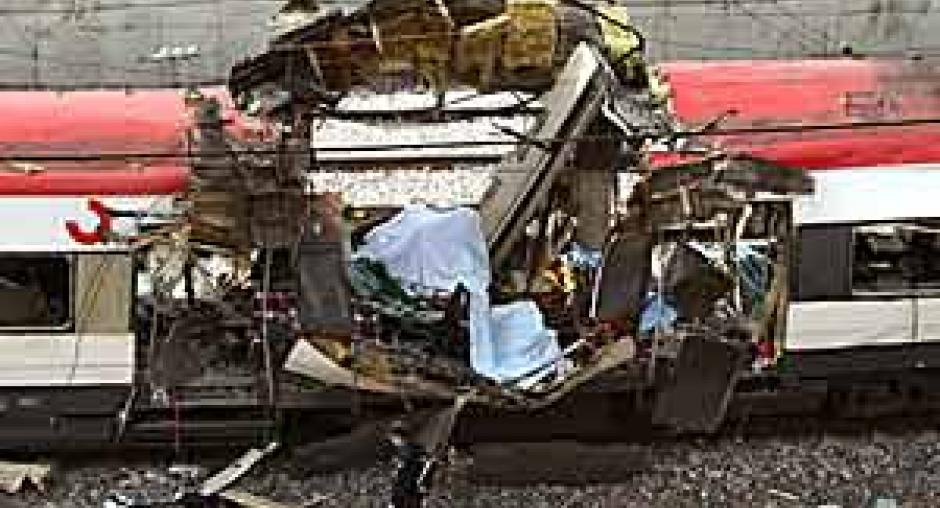Newsroom
UN-OSCE counter-terrorism conference begins with minute's silence for Madrid victims
VIENNA 11 March 2004

(Reuters)A Spanish policeman walks past a hole in a train after an explosion at Madrid's Atocha station, 11 March 2004. Nearly 200 people were killed and more than 1,400 injured in simultaneous blasts. (Reuters) Photo details
VIENNA, 11 March 2004 - A UN-OSCE counter-terrorism conference in Vienna began on Thursday with a minute's silence in honour of the victims of terrorist bomb attacks in Madrid earlier in the day.
Ambassador Jan Kubis, Secretary General of the Organization for Security and Co-operation in Europe, expressed his horror at the innocent loss of life on behalf of all participants in the third global meeting of international, regional and sub-regional organizations to strengthen counter-terrorism action.
UN Counter-Terrorism Committee Chairman, Ambassador Inocencio Arias of Spain, opened the session by calling for improvements in the way international organizations co-ordinate and collaborate in countering global terrorism. Ambassador Arias pointed to the collaboration between the OSCE and the UN Office of Drugs and Crime (UNODC) as an example for other organizations to adopt.
The two-day meeting is looking at ways to strengthen joint efforts of international organizations in their global actions against terrorism. Concrete suggestions will be made on planning, co-ordination and execution of future joint activities, as well as strengthening the exchange of information.
OSCE Secretary General Kubis said focused, expert, technical anti-terrorism workshops such as those recently organized by the OSCE s Action against Terrorism Unit were yielding concrete results. He joined other organizations represented at the conference in supporting the leadership of the United Nations Counter-Terrorism Committee to ensure cohesion in the collective actions of international, regional and sub-regional organizations.
Antonio Maria Costa, the Executive Director of the UNODC, said there is strong evidence of a close link between terrorism and organized crime, including trafficking in drugs, firearms and human beings, as well as money-laundering.
"These crimes both precede and accompany terrorist crimes since terrorist groups operate in the same black marke ts where organized crime is active. We can weaken terrorist groups by going forcefully after their profit-oriented activities," Mr. Costa said, pointing to a need to survey and monitor the multiple relations between terrorism and profit-driven transnational crimes.
Under the leadership of the OSCE, the first part of the meeting today was addressing current and emerging threats, with two working sessions focusing on the threat posed to civil aviation by Man-Portable Air Defence Systems (MANPADS) and on the need to break the nexus between terrorism and organized crime.
The second day of the meeting on Friday will focus on four areas: preventing the financing of terrorism; ratification and implementation of 12 universal anti-terrorism instruments; border management issues; and co-ordination between international, regional and sub-regional organizations.
Ambassador Arias and conference co-hosts, UNODC Executive Director Antonio Maria Costa and OSCE Secretary General Jan Kubis, will provide a readout of conference proceedings and results at a press conference tomorrow at 11:30 at the Vienna International Centre. VIC.
Ambassador Jan Kubis, Secretary General of the Organization for Security and Co-operation in Europe, expressed his horror at the innocent loss of life on behalf of all participants in the third global meeting of international, regional and sub-regional organizations to strengthen counter-terrorism action.
UN Counter-Terrorism Committee Chairman, Ambassador Inocencio Arias of Spain, opened the session by calling for improvements in the way international organizations co-ordinate and collaborate in countering global terrorism. Ambassador Arias pointed to the collaboration between the OSCE and the UN Office of Drugs and Crime (UNODC) as an example for other organizations to adopt.
The two-day meeting is looking at ways to strengthen joint efforts of international organizations in their global actions against terrorism. Concrete suggestions will be made on planning, co-ordination and execution of future joint activities, as well as strengthening the exchange of information.
OSCE Secretary General Kubis said focused, expert, technical anti-terrorism workshops such as those recently organized by the OSCE s Action against Terrorism Unit were yielding concrete results. He joined other organizations represented at the conference in supporting the leadership of the United Nations Counter-Terrorism Committee to ensure cohesion in the collective actions of international, regional and sub-regional organizations.
Antonio Maria Costa, the Executive Director of the UNODC, said there is strong evidence of a close link between terrorism and organized crime, including trafficking in drugs, firearms and human beings, as well as money-laundering.
"These crimes both precede and accompany terrorist crimes since terrorist groups operate in the same black marke ts where organized crime is active. We can weaken terrorist groups by going forcefully after their profit-oriented activities," Mr. Costa said, pointing to a need to survey and monitor the multiple relations between terrorism and profit-driven transnational crimes.
Under the leadership of the OSCE, the first part of the meeting today was addressing current and emerging threats, with two working sessions focusing on the threat posed to civil aviation by Man-Portable Air Defence Systems (MANPADS) and on the need to break the nexus between terrorism and organized crime.
The second day of the meeting on Friday will focus on four areas: preventing the financing of terrorism; ratification and implementation of 12 universal anti-terrorism instruments; border management issues; and co-ordination between international, regional and sub-regional organizations.
Ambassador Arias and conference co-hosts, UNODC Executive Director Antonio Maria Costa and OSCE Secretary General Jan Kubis, will provide a readout of conference proceedings and results at a press conference tomorrow at 11:30 at the Vienna International Centre. VIC.
